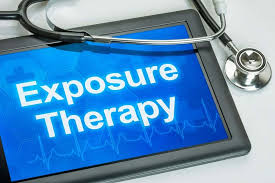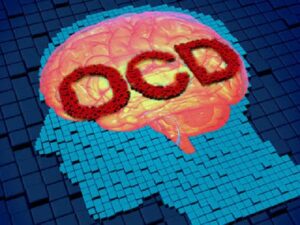If you or someone you know is living with OCD, you may have heard about ERP therapy. ERP stands for Exposure and Response Prevention, one of the most recommended types of Cognitive Behavioral Therapy (CBT) for those living with obsessive-compulsive disorder. ERP therapy can help people with OCD to reduce the frequency and intensity of their compulsions and take back control over their lives. If you’re looking for an OCD therapist in your area that specializes in ERP therapy, this post is for you! Read on to learn more about what to look for in a qualified therapist and how to find one near you.
Contents
What is ERP Therapy?

ERP is short for Exposure and Response Prevention. It is the most effective evidence-based treatment for OCD. ERP therapy involves gradually and intentionally confronting the things that trigger your OCD while learning to resist the urge to perform rituals or compulsions.
The goal of ERP therapy is to help you become less afraid of your thoughts and feelings and more tolerant of discomfort. With practice, you will learn that your OCD thoughts are not true and that you can handle the anxiety they cause without resorting to compulsive behaviors.
ERP therapy is usually conducted by a licensed mental health professional with experience treating OCD. Your therapist will work with you to develop a list of exposures – situations, objects, or activities that trigger your OCD symptoms. You will then work together to create a graduated hierarchy of exposures, starting with those that provoke only mild anxiety and progressing to those that cause moderate or severe anxiety.
Your therapist will guide you through each exposure, helping you stay in the situation long enough to allow your anxiety to decrease on its own. During this process, it is essential not to engage in any rituals or compulsions. If you do, the exposure will be less effective and may even make your OCD worse.
Most people with OCD require 10-20 sessions of ERP therapy before they see significant improvement in their symptoms. However, some people may need more or less treatment depending on the severity of their OCD.
What is OCD?

Obsessive-compulsive disorder (OCD) is a mental illness that causes people to have uncontrollable, reoccurring thoughts (obsessions) and behaviors (compulsions) that they feel the need to do over and over.
People with OCD can have any combination of obsessions and compulsions, but most people with the disorder have both. Obsessions are unwanted, intrusive thoughts, images, or urges that trigger intensely distressing feelings. Common obsessions include fear of contamination or germs, worries about safety or harm, and having things in a specific order or symmetry. Compulsions are repetitive behaviors that a person feels compelled to do to try to relieve their anxiety or distress. Common compulsions include handwashing, counting, checking things, and cleaning. People with OCD often know that their obsessions and compulsions are irrational, but they cannot control them.
OCD can cause a great deal of distress and interfere with a person’s ability to function at work, school, or home. It is estimated that 1 in 100 adults has OCD.1 People with OCD often hide their symptoms because they feel ashamed or embarrassed. This can make it difficult to get help and make treatment less effective.
Types of ERP Therapy For OCD Near Me
There are many types of ERP Therapy for OCD near you. Depending on your needs and the severity of your OCD, different types of interventions may be recommended. Here are some examples:
Imaginal Exposure
One of the most common forms of ERP is imaginal exposure. This method involves exposing yourself to the thoughts, images, and sensations related to your OCD obsessions. With guidance from a therapist, you gradually and repeatedly confront these triggers until they become less distressing. There are also virtual reality platforms that use imaginal exposure to help people with OCD.
Cognitive Restructuring
Cognitive restructuring is another form of ERP therapy that focuses on changing irrational thoughts related to OCD. This form of therapy works by teaching you how to identify and challenge unhelpful thoughts that lead you down a path of obsessive-compulsive behaviors. It teaches you how to replace these irrational thoughts with healthier, more reasonable thoughts.
Response Prevention
Response prevention is another type of ERP that challenges individuals to resist compulsions and rituals. Cognitive restructuring can be used alongside response prevention as a way of re-framing thoughts and refocusing on more helpful perspectives. Some people may also benefit from using response prevention apps to stay motivated and track their progress.
Mindfulness Training
Mindfulness training teaches individuals how to focus their attention on the present moment without judgment, allowing them to recognize and accept their thoughts instead of resisting them. This can help people with OCD healthily manage their symptoms. Mindfulness-based cognitive therapy is a type of ERP that combines mindfulness training with traditional cognitive restructuring.
How to Find an ERP Therapist Near Me?

To find an ERP therapist near you, start by searching online directories. You can also ask your primary care doctor for a referral to a mental health specialist who offers ERP therapy.
Once you have a list of potential therapists, reach out to them to see if they offer ERP therapy and if they have experience treating OCD. It’s also important to make sure that the therapist is a good fit for you personally. For example, you may want to consider whether the therapist has a style that makes you feel comfortable and whether they offer sliding scale fees based on your income.
Sometimes, it can take time to find the right therapist for you. Don’t lose hope if your first few attempts don’t work out—keep searching until you find a therapist who you feel comfortable with and who has the experience and expertise to help you manage your OCD symptoms.
Benefits of ERP Therapy For OCD Near Me
If you are looking for ERP therapy for OCD near me, there are many benefits that you can expect to experience. This type of therapy is effective in treating OCD, and it can help you to reduce your symptoms and improve your quality of life. Here are some of the benefits that you can expect to experience from ERP therapy:
1. You will learn how to manage your OCD symptoms.
ERP therapy will teach you how to identify and challenge your negative thoughts and beliefs about your OCD symptoms. This will help you to better control your symptoms and eventually lead to a reduction in their intensity and frequency.
2. You will gain a better understanding of your condition.
ERP therapy will help you to understand more about your condition and how it affects your life. This knowledge can be empowering and help you to feel more in control of your condition.
3. You will develop coping strategies for dealing with difficult situations.
ERP therapy will provide you with tools and techniques that you can use to deal with difficult situations in a more constructive way. This can help you to avoid triggers for your OCD symptoms and manage them more effectively when they do occur.
4. You will learn how to manage stress effectively.
Stress is often a trigger for OCD symptoms, so learning how to effectively manage stress can be very helpful in reducing the severity of your symptoms. ERP therapy can teach you stress management techniques that can help you to keep your OCD symptoms under control.
5. You will gain a greater sense of self-confidence.
ERP therapy can help you to recognize and challenge negative thought patterns that may be contributing to your OCD symptoms. This can lead to an increase in your self-esteem and self-confidence, which can help you to better manage your condition.
Limitations of ERP Therapy For OCD Near Me

There are a few potential limitations to ERP therapy for OCD near me that should be considered before beginning treatment.
Time-Consuming
Sometimes, ERP therapy can be pretty time-consuming. Furthermore, This can be a problem for people who have difficulty finding the time to attend counseling sessions or do the necessary homework activities.
Costly
ERP therapy may also be costly depending on where you live and your insurance coverage. It may take several weeks of treatment before a person feels any improvement, which can add up quickly if you are paying out of pocket.
Unpredictable Results
ERP therapy is not a guaranteed cure for OCD and results can vary from person to person. Some individuals might experience great improvements in their symptoms while others may see only slight changes. Also, results are not always immediate and may take several weeks or even months before any significant changes are seen.
Conclusion
ERP therapy for OCD can be a great way to help manage the symptoms of this disorder. If you are looking for an ERP therapist near you, we hope our guide has helped point you in the right direction. Understanding your condition and knowing what kind of treatment is available, puts you in a better position to make informed decisions about your care. Taking a proactive approach towards getting the right help is important when dealing with an issue like OCD, so please consider seeking professional support if needed.
For more information and guidance, please contact OCDMantra. OCD is a mental health disorder characterized by obsessions and compulsions. If you have any queries regarding OCD treatment, ERP therapy experienced therapists at OCDMantra can help: Book a trial OD therapy session.


